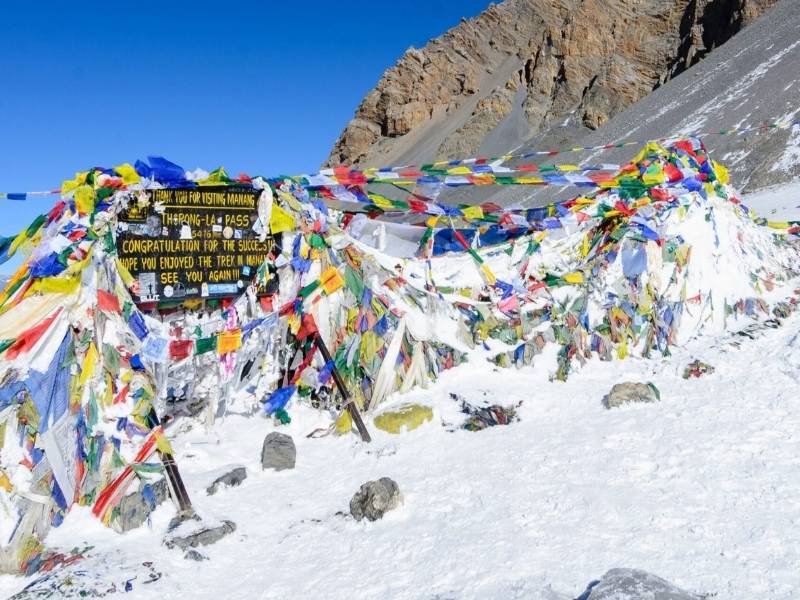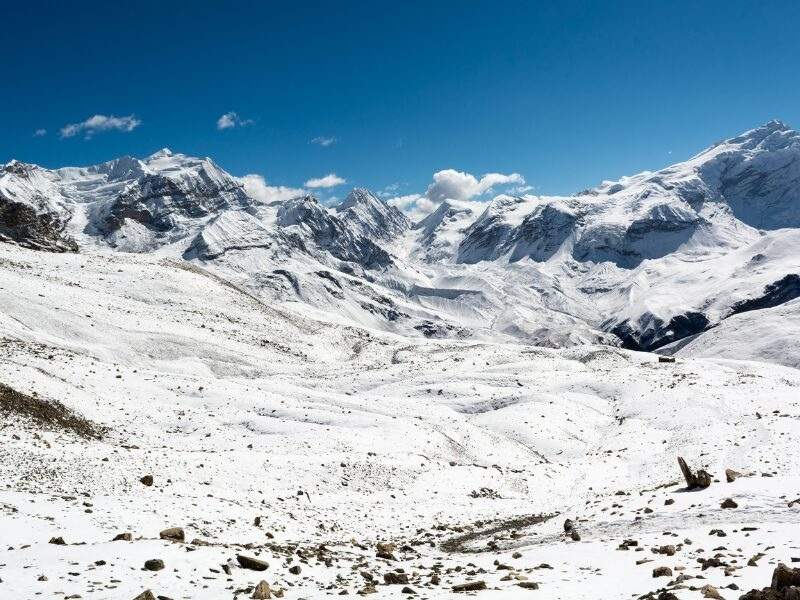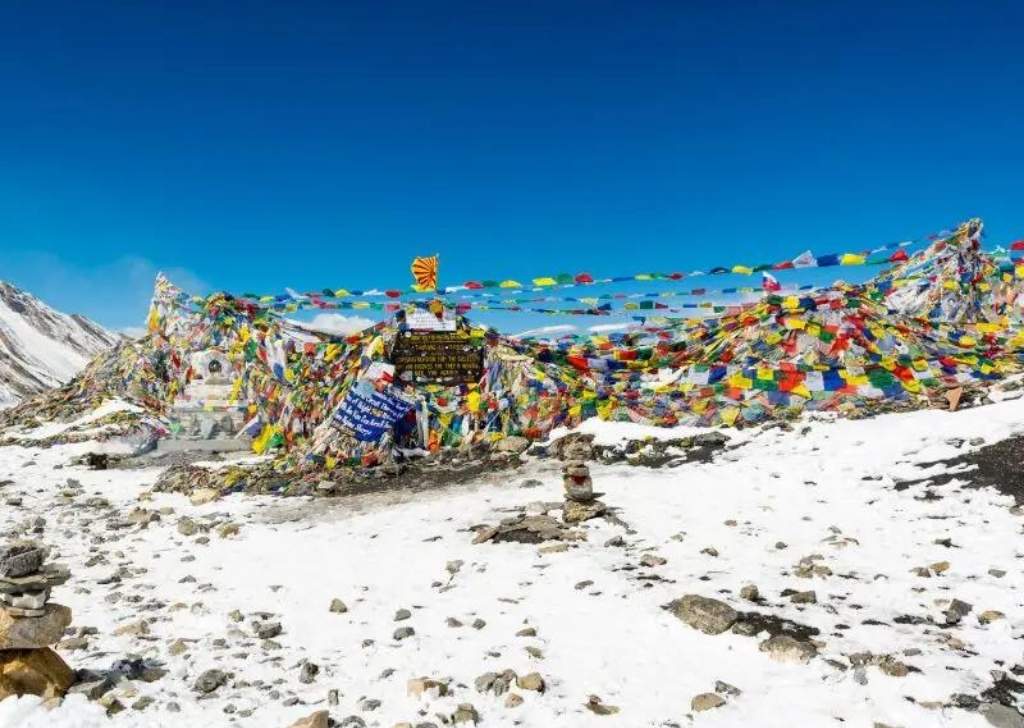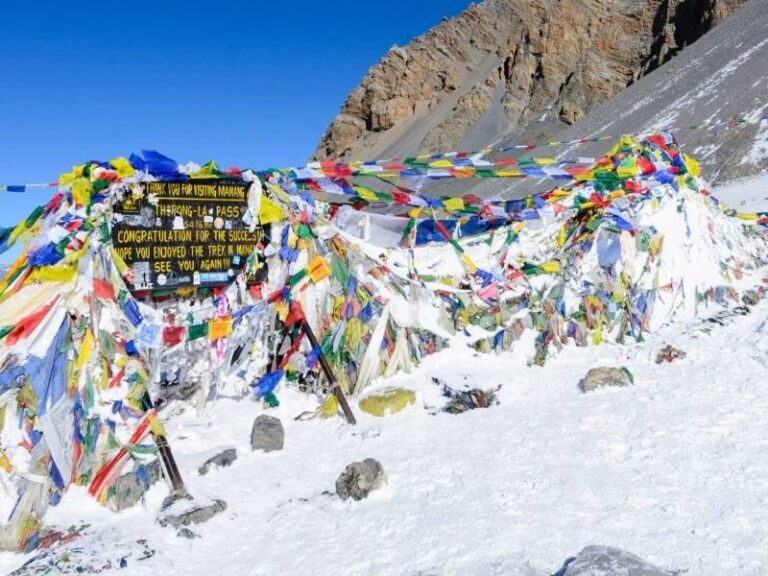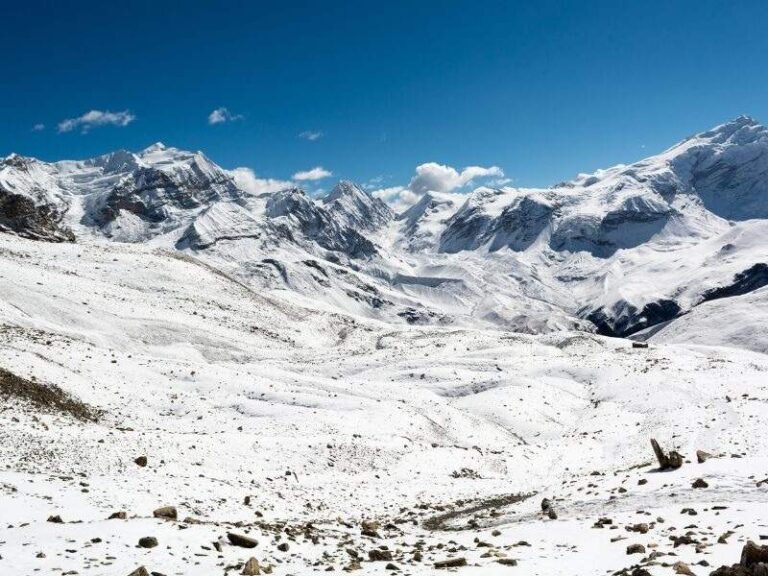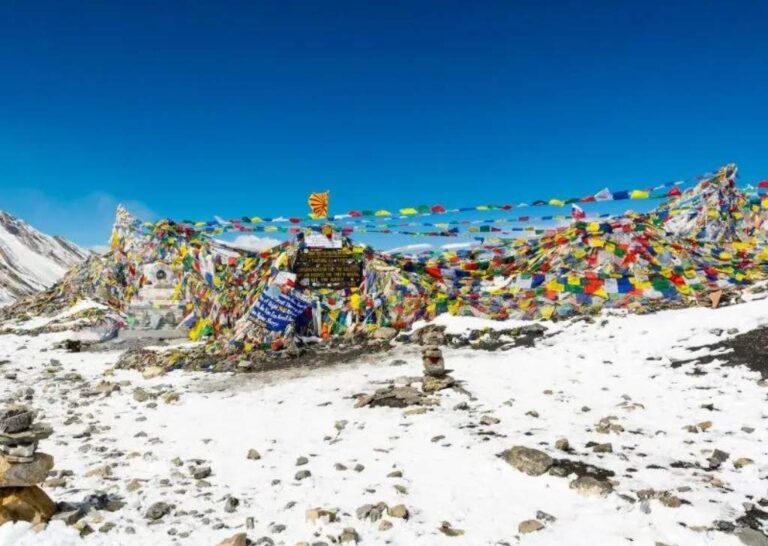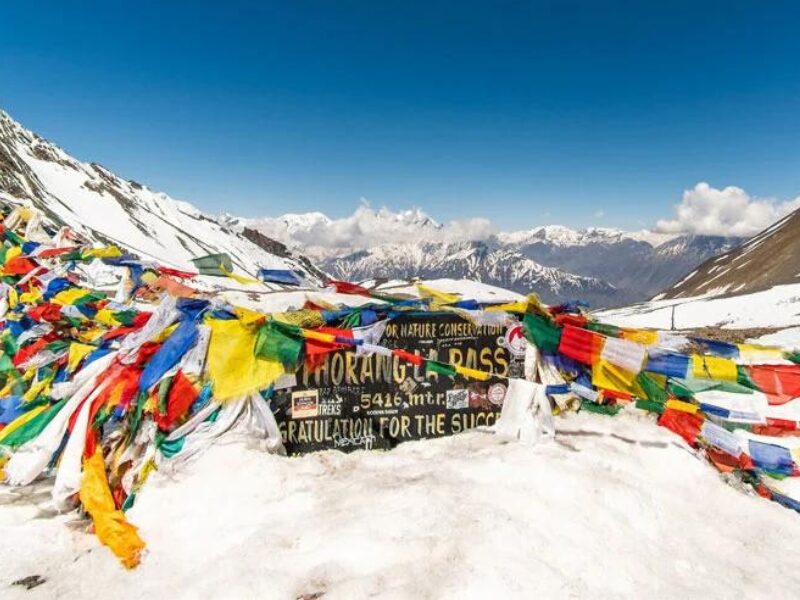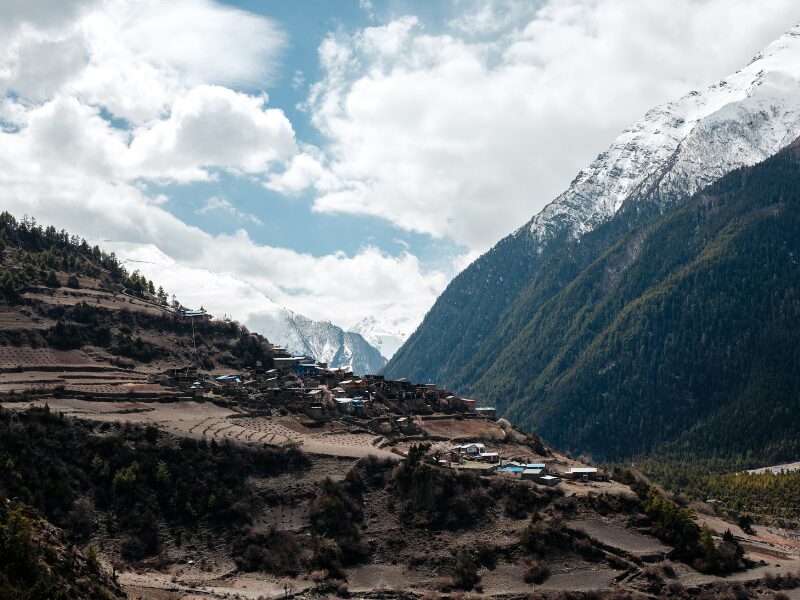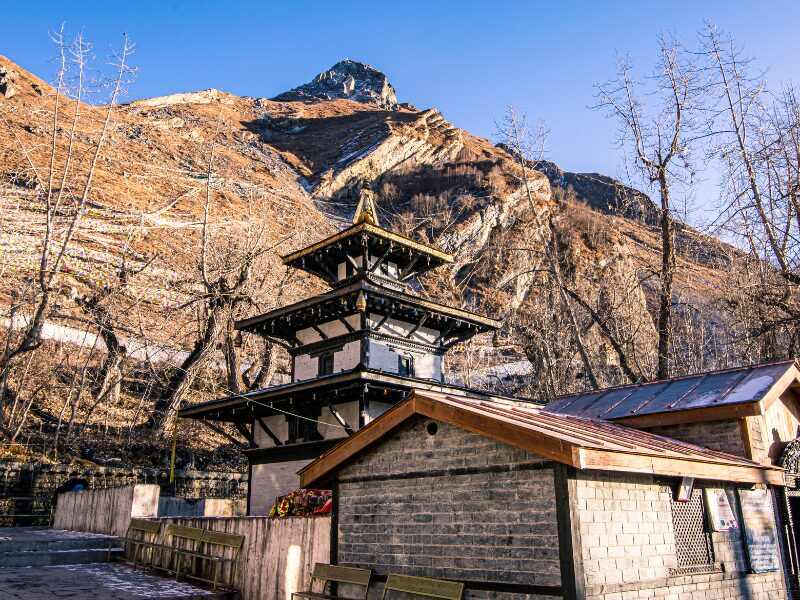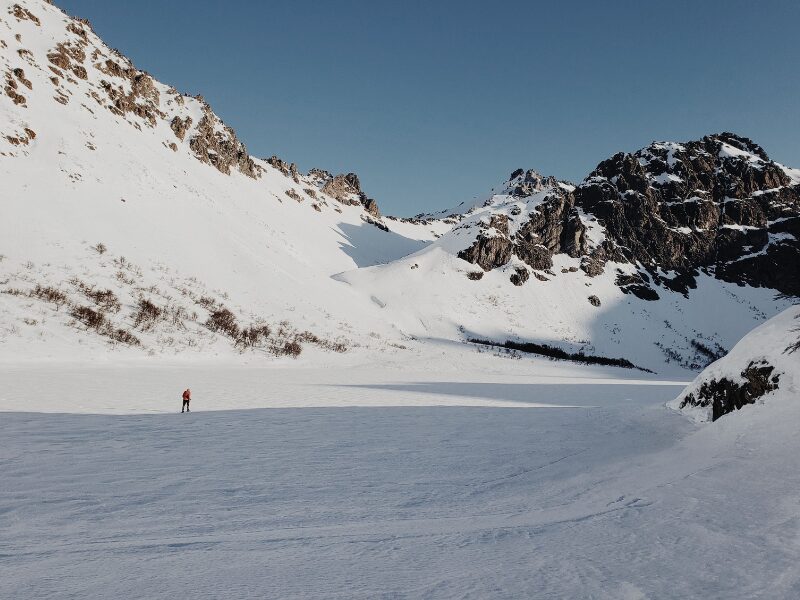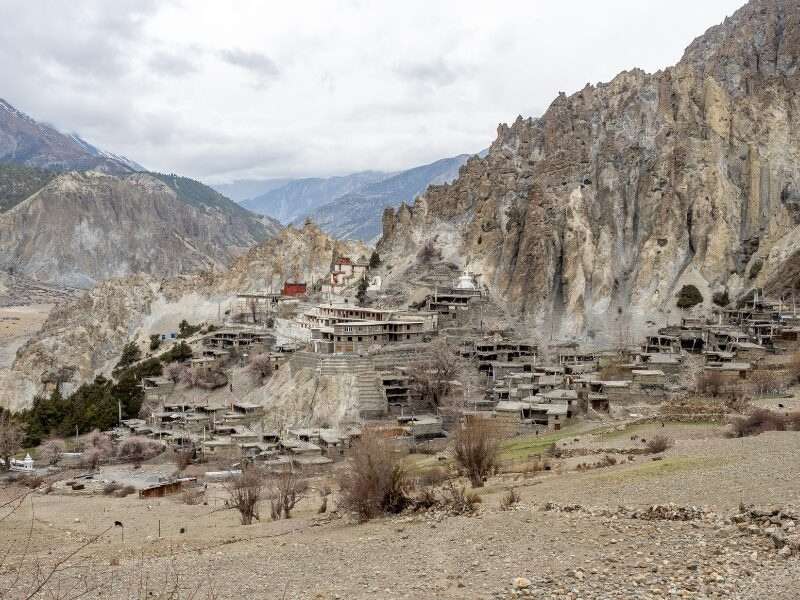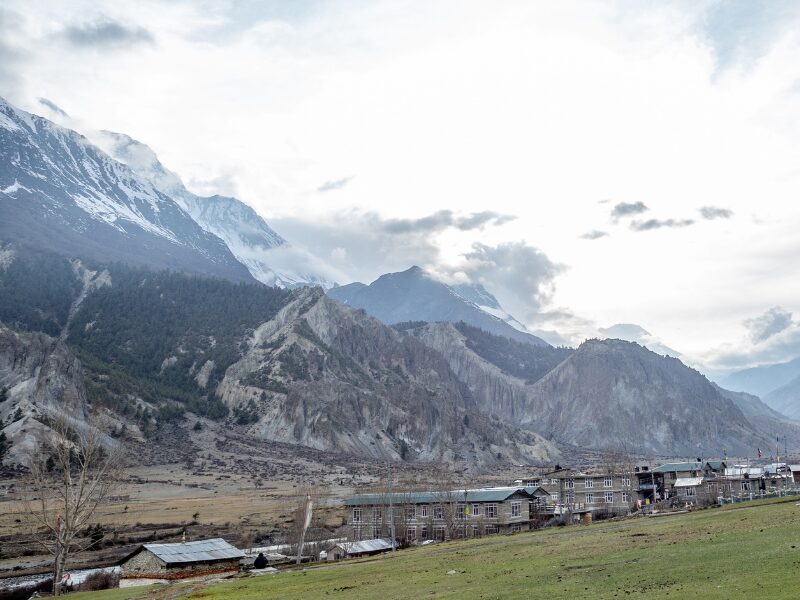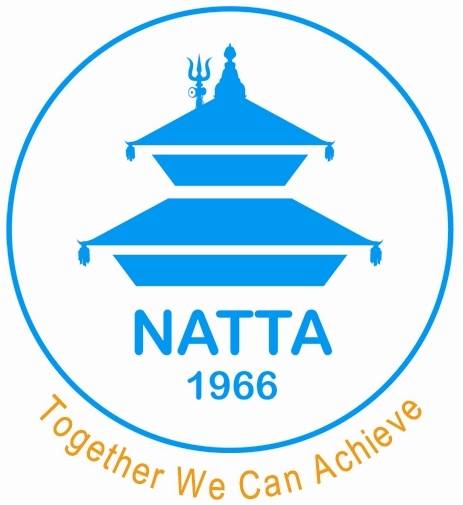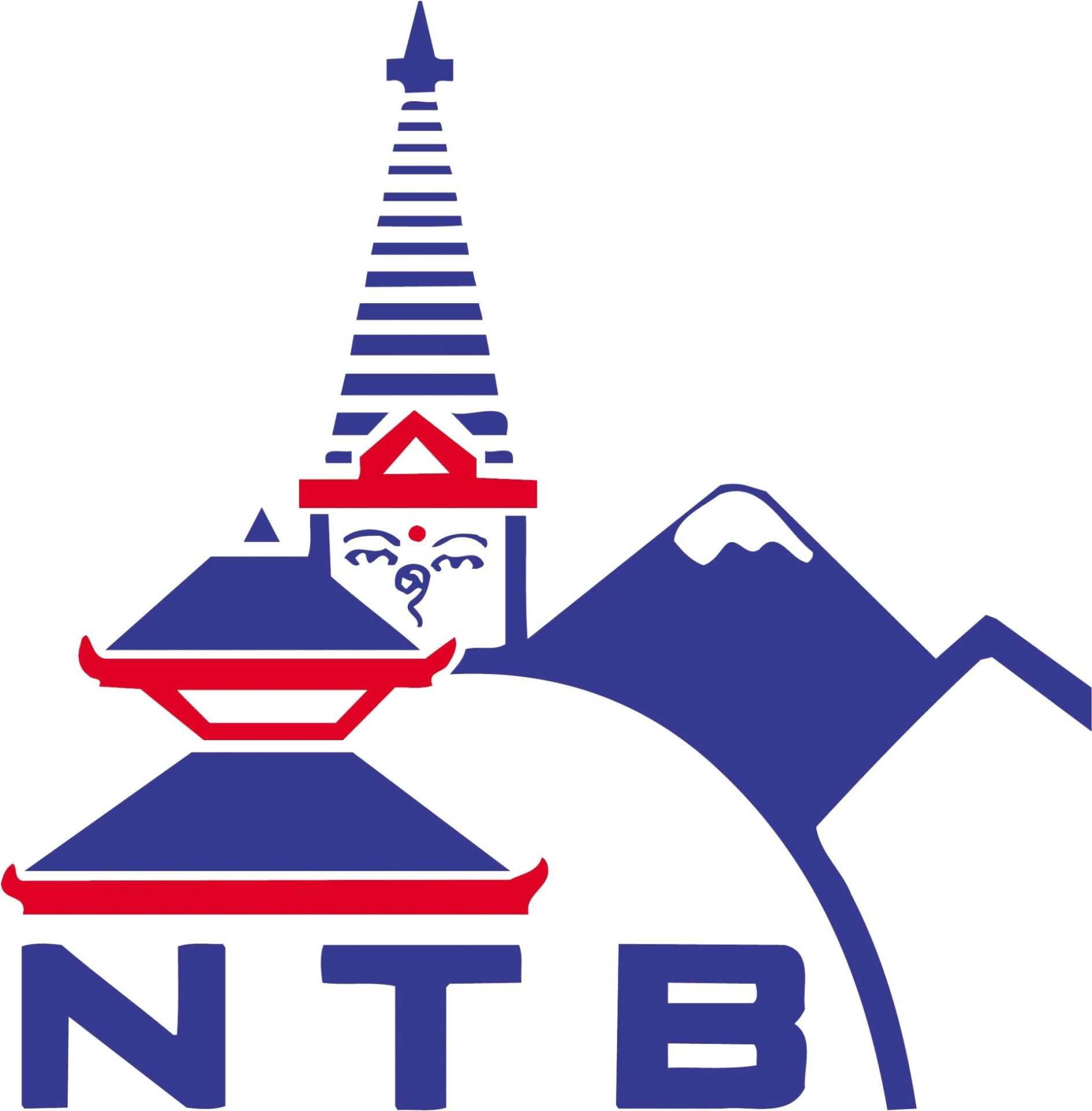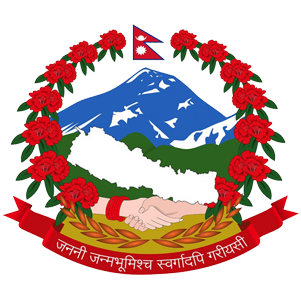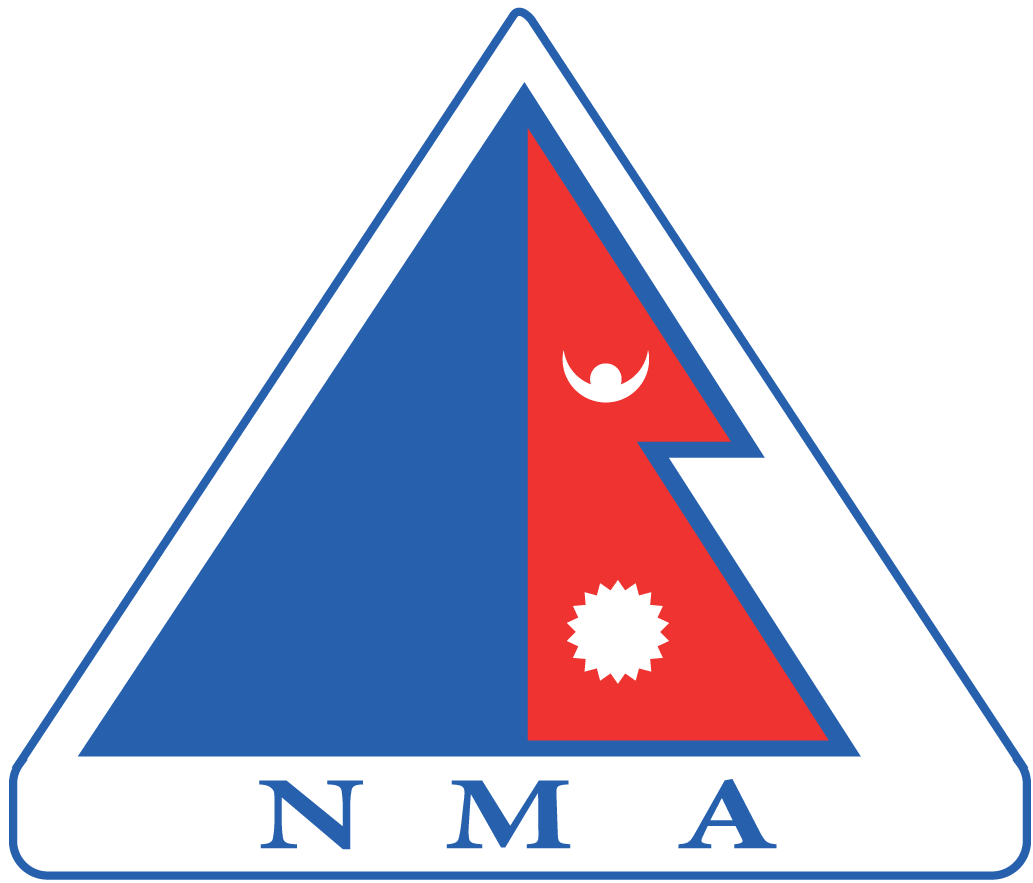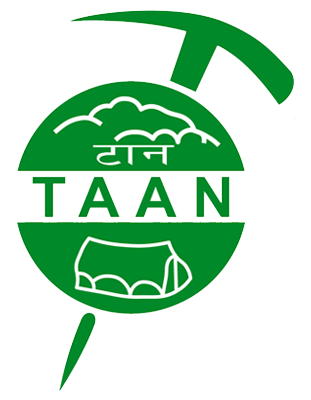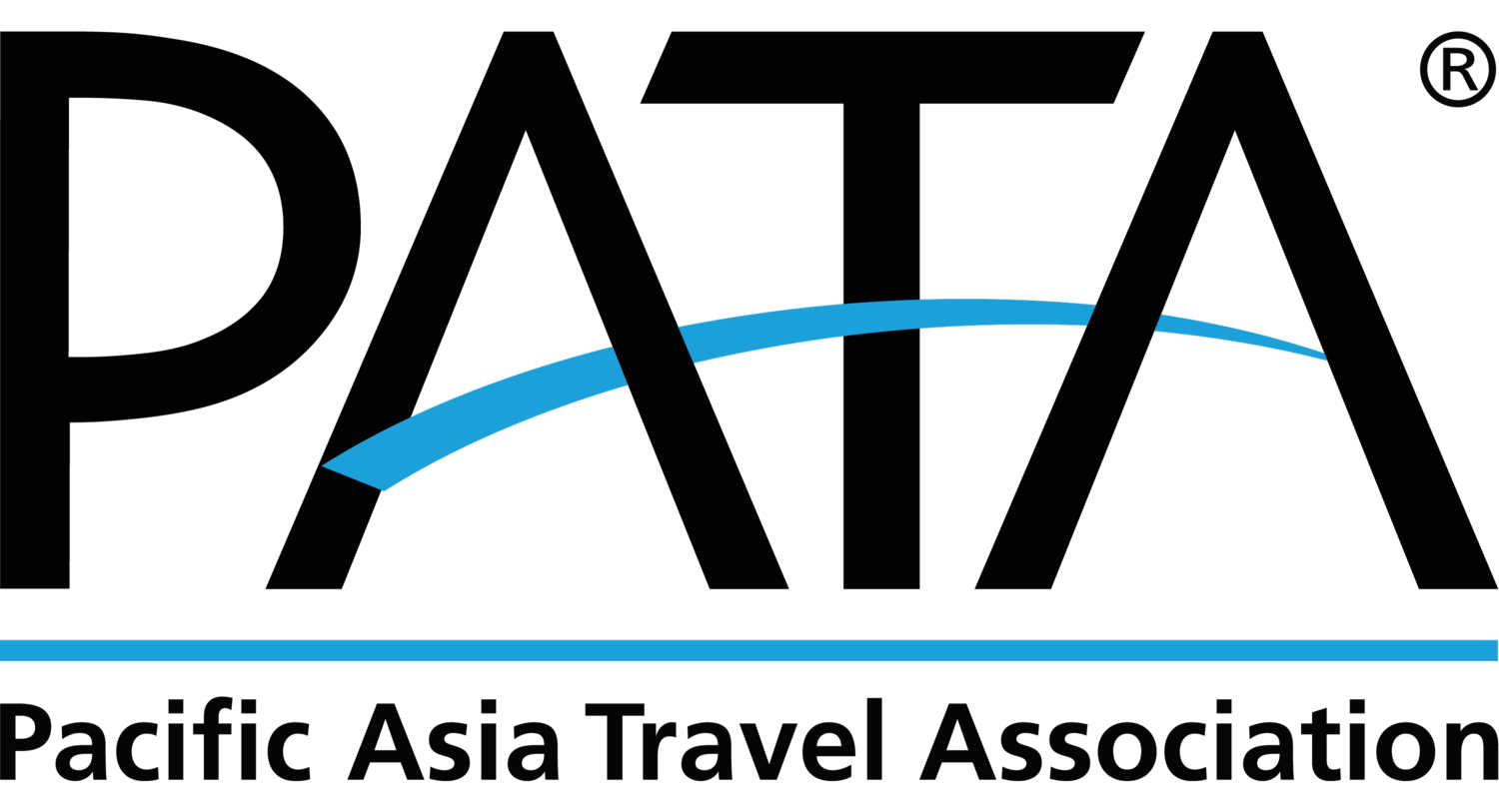Thorong La Pass Trek
Thorong La Pass Trek – Annapurna Circuit Adventure!!
Thorong La Pass is a high-altitude mountain pass in the Annapurna region of Nepal. It is a high point of the Annapurna Circuit, which makes it one of the most popular treks in the world. Thorong La Pass is one of the highest trekking passes globally, with an elevation of 5,416 meters above sea level. The Thorong La Pass Trek takes you through a variety of landscapes, including subtropical forests, terraced fields, and alpine meadows.
The Thorang la Pass Trek offers stunning views of the Mt. Annapurna and Mt. Dhaulagiri ranges, as well as diverse flora and fauna. It also provides breathtaking panoramic views of the surrounding peaks, including Annapurna, Gangapurna, and Khatung Kang. The trek takes you to Manang Valley, a beautiful village with a rich Tibetan-influenced culture, and Muktinath, a sacred town known for its religious significance and natural beauty.
Trip Overview
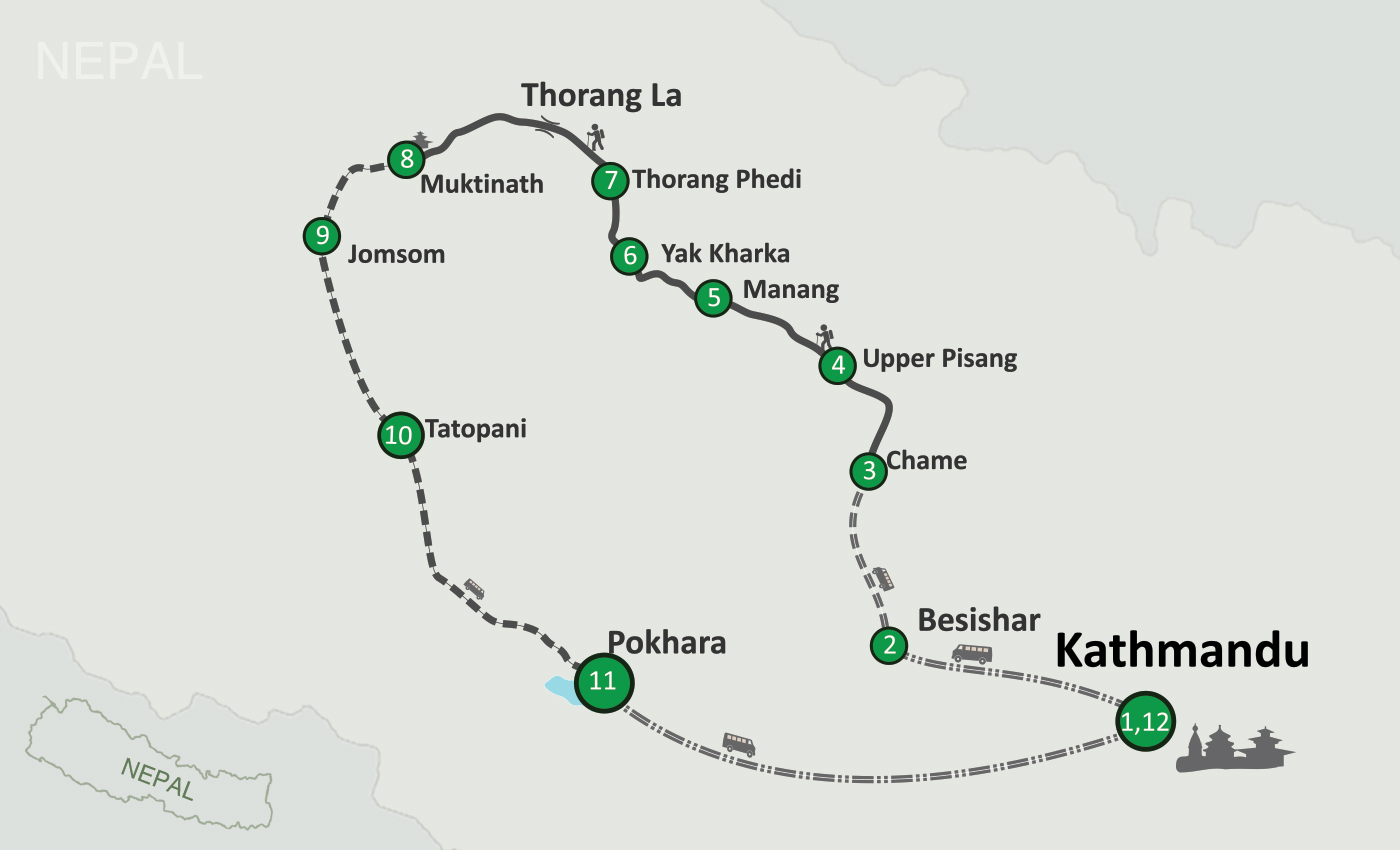
 Duration: 12 Days
Duration: 12 Days  Max Altitude: Thorong La Pass (5416 m)
Max Altitude: Thorong La Pass (5416 m)  Transportaion: Private Vehicle
Transportaion: Private Vehicle  Accomodation: Hotel / Lodge or Teahouse
Accomodation: Hotel / Lodge or Teahouse  Start: Kathmandu
Start: Kathmandu  End: Kathmandu
End: Kathmandu  Meals: European Plan
Meals: European Plan Outline Itinerary
Kathmandu (Arrival) – Transfer to Hotel (Private Transfer)
Kathmandu – Besishar (Drive – Private Transfer)
Besishar (823 m; 6 hrs)Besishar - Chame (Drive – Private Transfer)
Chame (2650 m; 3 hrs)Chame – Upper Pisang
Upper Pisang (3250m; 6 hrs)Upper Pisang - Manang
Manang (3519 m; 5 hrs)Manang
Manang (3519 m)Manang – Yak Kharka
Yak Kharka (4020m; 5 hrs)Yak Kharka – Thorong Phedi
Thorang Phedi (4450m; 4hrs)Thorong Phedi – Thorong La Pass - Muktinath – Tatopani (Drive- Private Transfer)
Thorong la Pass (5416 m), Tatopani (1190 m; 9 hrs)Tatopani – Pokhara (Drive Transfer)
Pokhara (822 m; 9 hrs)Pokhara – Kathmandu (Drive- Private Transfer)
Kathmandu (1400 m; 6 hrs)Kathmandu (Departure)
Price Inclusion
- Airport transfers on a tourist vehicle
- Entire accommodation during the trek – 2 nights at hotel in Kathmandu, 1 night at hotel in Pokhara, and 8 nights in lodges/guesthouse during trek to Thorong La Pass
- Hotel breakfast during the stay at Kathmandu and Pokhara
- Private tourist vehicle (Kathmandu to Besishar to Chame), (Muktinath to Pokhara), and (Pokhara to Kathmandu)
- Experienced, government licensed, English-speaking or another language trekking guide
- All necessary permits for Annapurna Conservation Area and TIMS (Trekkers’ Information Management System)
- Porters during the trek for carrying luggage (1 porter for every 2 pax)
- All government taxes and administrative expenses
- Local staff insurances
Price Exclusion
- International flight tickets and Nepal Entry Visa
- Personal travel insurance
- Any meals during the Trek
- Any expenses of a personnel nature, e.g., telephone calls, laundry, table drinks, etc.
- Any Tips to Guides, Drivers, and Trekking Staffs
- Any entrance fees for cameras and video cameras at the monuments
- Any other services not mentioned above
- Cost of any emergency evacuation, strikes, etc.
Detail Itinerary
Expand AllKathmandu (Arrival) – Transfer to Hotel (Private Transfer)
Upon arrival in Kathmandu, the capital city of Nepal, our representative will be waiting at the airport for your welcome. Then board a private vehicle and be transferred to your hotel. Check into your hotel and rest after your journey.
Depending on your arrival time, you may have the opportunity to explore ancient temples and vibrant markets and experience the unique atmosphere of Nepalese urban life.
Kathmandu – Besishar (Drive – Private Transfer)
Early in the morning, your trekking guides will pick you up from your hotel and head towards your destination. Embark on a scenic drive that takes you through scenic landscapes, terraced fields, and charming villages. You will reach Besisahar, a bustling town and the gateway to the Annapurna Circuit.
Besishar - Chame (Drive – Private Transfer)
After your breakfast, you will start your day by driving to Chame, the headquarters of Manang. The ride to Chame offers stunning views of the Marsyangdi River and the lush forest, providing glimpses of the changing scenery as you ascend into the Annapurna region. Upon reaching Chame, you can enjoy the serene surroundings and explore the local culture.
Chame – Upper Pisang
Today, you will start your trek by passing through the dense forest of rhododendrons along the Marsyangdi River and coming across the beautiful panoramic views of meadows and mountains. As you walk through a steep and narrow valley, you will see the first view of the big Paungda Dada rock face, which is shaped like a bowl.
After crossing that, you will get a close view of Pisang Peak, with Mt. Annapurna II in the background. After descending the trail to take you to Pisang village, immerse yourself in the local Tibetan culture and visit the ancient Pisang Monastery.
Upper Pisang - Manang
You will continue your trek by walking through the upper trails, where you can witness the stunning views of the north faces of Annapurna II, III, and IV, Pisang Peak, Tilicho, and Gangapurna. On the way to Manang Valley, your trekking trails pass through diverse terrain and the traditional village, where you will get the chance to explore the unique Tibetan culture.
As you ascend more, you will start to notice changes in the landscape and vegetation. After reaching Manang, it offers breathtaking views of the surrounding mountains and a chance to explore the local culture.
Manang
Today is your rest day in Manang for acclimatization. You can also explore the village, visit monasteries, and enjoy the stunning mountain views. You can also go for a short hike to the Gangapurna Glacier Lake and Ice Lake, which offer magnificent views of Annapurna III. Or, you can rest and acclimatize to the altitude with the stunning views of Manang Valley. It is essential to acclimatize before ascending to higher altitudes.
Manang – Yak Kharka
After exploring Manang Valley, you will trek to Yak Kharka. The route ascends slowly through Tenki Manang, leaving the Marsyangdi Valley behind. As you continue to walk the trail, pass through the stunning landscapes, including alpine meadows and rugged terrain.
As you ascend, the landscapes become more barren with the rocky terrain and less vegetation, but it also provides the beautiful views of Annapurna Mountain Range.
Yak Kharka – Thorong Phedi
Today you will have a short yet a bit difficult walk towards Thorong Phedi. The path takes you through rugged terrain with breathtaking views of the mountain range. As you ascend, you will witness yak fields with mountainous scenery in the background, and then descend to cross the river.
After crossing the river, you will climb through towering cliffs to reach Thorong Phedi, a base for the challenging Thorong La Pass.
Thorong Phedi – Thorong La Pass - Muktinath – Tatopani (Drive- Private Transfer)
Today, you will have a long and challenging day as you ascend from Thorong Phedi to reach Thorong La Pass (5416 m), which is the highest trekking point of this trek. Waking up early in the morning, you will hike up to the mountain, where you will be rewarded with breathtaking views of Manang Valley and the Annapurna and Dhaulagiri Mountain ranges.
Upon reaching the pass, you will enjoy the magnificent views from the top of Thorong La Pass and then descend to Muktinath, a sacred pilgrimage site for both Hindus and Buddhists. After visiting Muktinath Temple, you will drive to Tatopani, known for its hot spring.
On the way to Tatopnai, you can visit the Kali Gandaki River Valley and witness the world’s deepest gorge, the Kali Gandaki gorge. After reaching Tatopani, you can relax in a hot spring bath.
Tatopani – Pokhara (Drive Transfer)
After enjoying the hot spring bath at Tatopani, early in the morning, you will have your breakfast and ride to Pokhara, which takes 9 hours of driving. The ride to Pokhara offers picturesque views of the landscape. You will enjoy the scenic drive along the Kali Gandaki River and lush green hills. After reaching there, you will check into the hotel, explore Pokhara in the evening, and enjoy the lakeside area.
Pokhara – Kathmandu (Drive- Private Transfer)
After having breakfast, you will drive back to Kathamndu. The ride takes you through stunning terrain, little villages, and the Marsyangdi and Trishuli rivers on the way. After reaching Kathmandu, you will be escorted towards the hotel, and in the evening, you will have a farewell dinner.
Kathmandu (Departure)
Depending on your flight schedule, our representative will escort you towards the airport. Before your fight schedule starts, you may have some free time in Kathmandu for last-minute shopping or sightseeing.
Why you'll love this trip
- Thorong La Pass is one of the world’s highest trekking passes, at 5,416 m above sea level
- Encounter rich Tibetan-influenced culture in villages like Manang.
- Enjoy breathtaking panoramic views of the Annapurna and Dhaulagiri Mountain ranges from the pass
- Visit the sacred pilgrimage site of Muktinath
- Opportunities to witness diverse flora and fauna in the Annapurna Conservation Area
- Interact with local communities and learn about their customs
- Thorong La Pass offers stunning landscapes, including the picturesque Kali Gandaki Gorge, the world’s deepest gorge
When To Visit
The best time to do the Thorong La Pass trek is during the two primary trekking seasons in the Annapurna region: the spring (March to May) and autumn (September to November) seasons. For the best viewing of the breathtaking Himalayan landscape, these months provide steady weather with clear skies, comfortable temperatures, and little precipitation. Bright rhododendron blooms are on display in the spring, and lush landscapes following the monsoon rains are seen in the autumn. These favorable conditions make for a safer and more enjoyable trek, allowing trekkers to navigate the challenging Thorong La Pass and fully appreciate the breathtaking landscapes of the Annapurna region. It’s advisable to avoid the winter months due to heavy snowfall and the monsoon season, which brings increased risks of landslides and challenging trail conditions.

Cannot see your date or not satisfied with the itinerary? We may be able to add new trip dates.
Contact UsElevation Chart
Trip Gallery
FAQs for Thorong La Pass Trek
How difficult is the Thorong La Pass trek?
The Thorong La Pass trek is considered challenging due to its high altitude and steep ascents. Proper adaptation and physical fitness are essential. Trekkers should be prepared for varying weather conditions, including cold temperatures and the possibility of snow at higher elevations.
What permits are required for the Thorong La Pass trek?
Trekkers need an Annapurna Conservation Area Permit (ACAP) and a Trekkers’ Information Management System (TIMS) card, both of which can be obtained in Kathmandu or Pokhara. Additionally, a special permit is required to trek in the restricted areas near Manang.
Are there any health risks associated with the Thorong La Pass trek?
Altitude sickness is a significant concern due to the high elevation of Thorong La Pass. Proper acclimatization, staying hydrated, and recognizing symptoms are crucial. In addition to carrying the required medications, hikers should speak with a healthcare provider prior to the trek. It’s also advisable to have travel insurance that covers emergency evacuations.
Are there teahouses on the trek route?
Yes, teahouses and guesthouses are available along the Thorong La Pass trek route, providing accommodation and meals. It’s advisable to carry some cash, as ATM facilities may be limited in remote areas.
What should I pack for the Thorong La Pass trek?
Packing essentials include warm clothing, a good pair of trekking boots, a backpack, a sleeping bag, water purification tablets, a first aid kit, and trekking poles. It’s crucial to pack according to the season and anticipated weather conditions.
What are the risks and challenges of the Thorong La Pass trek?
Key challenges include high altitude, the potential for altitude sickness, extreme weather conditions, and strenuous ascents and descents. Proper acclimatization, physical fitness, and careful planning are crucial to minimizing these risks. Trekkers should also be prepared for rapidly changing weather conditions, and flexibility in the itinerary is advisable.

